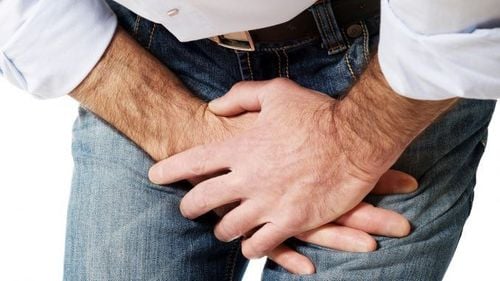This is an automatically translated article.
Erectile dysfunction is a fairly common problem for men, significantly affecting the quality of life and psychology of the sufferer. This article will provide more detailed information about this disease.
1. Erectile Dysfunction (ED)
Erectile dysfunction (ED) occurs when a man has ongoing problems maintaining and maintaining an erection of the penis. If left untreated, erectile dysfunction can make it difficult to have sex. According to the statistics of studies, 1 in 5 men will have this disease and that number is increasing with age.
Sexual dysfunction or erectile dysfunction becomes more common with increasing age. Only about 5% of men aged 40 have this condition. But that number rises to 15% of men in their 70s. Your doctor can treat erectile dysfunction no matter your age. Age is not the only cause of the condition. However, certain diseases such as type 2 diabetes, obesity, smoking and high blood pressure are all associated with a higher risk.
Erectile dysfunction can occur when the blood flow in the penis is limited or the nerves are damaged. The way erectile dysfunction in men is that during sexual arousal, nerves release chemicals in the body that increase blood flow to the penis. Blood flows into the 2 erection chambers in the penis, which is then made by spongy muscle tissue (cavernous body) and makes the cavernous cavities non-empty.
During an erection, spongy tissues relax and keep blood in place. At the same time, the blood pressure in the cavities makes the penis erect. When a man orgasms, this is the second set of nerve signals that are transmitted to the penis and cause the muscle tissue in this part to contract, blood is released back into the man's circulatory system, erection. stiffness will also decrease.
When you are not sexually stimulated, the penis is soft and flaccid. Men can easily notice how the size of the penis changes with warmth, cold or anxiety. These phenomena are completely normal, reflecting the balance of blood flow to and from the penis.

Rối loạn cương dương có thể gây khó khăn cho việc quan hệ tình dục
2. Symptoms of Erectile Dysfunction
With erectile dysfunction, it is difficult for men to achieve or keep an erection firm enough for sexual intercourse, becoming an everyday and frustrating problem.
Some signs to recognize the symptoms of erectile dysfunction:
The penis is too soft or can't get an erection to have sex; Erections that don't last long enough to have sex; Inability to get an erection. Erectile dysfunction can be a major warning sign of cardiovascular disease that indicates a blockage is forming in a man's vascular system. Several studies have shown that erectile dysfunction in men increases the risk of heart attack, stroke or circulation problems in the legs.
Erectile dysfunction also causes some other problems as follows:
Low self-esteem; Depression; Suffering for men and their partners. If erectile dysfunction is affecting a man's well-being or other relationships, it should be treated. Treatment is aimed at correcting or enhancing erectile function, improving circulatory health and a man's quality of life.
3. Causes of Erectile Dysfunction ED
Causes of chronic disease The link between chronic disease and erectile dysfunction is particularly prominent in people with diabetes. Men with diabetes have a high risk of erectile dysfunction, 2-3 times higher than the general population.
Controlling blood sugar can reduce the risk of this happening. Any condition that affects blood flow in the body can lead to erectile dysfunction ED. This condition can include cardiovascular disease, atherosclerosis (hardening of the arteries), kidney disease, and multiple sclerosis.
Causes of Erectile Dysfunction Related to Lifestyle Lifestyle and erectile dysfunction are also related. Smoking, heavy drinking, and drug use disorders can damage blood vessels and reduce blood flow to your penis. Being overweight and getting too little exercise also increase the odds of the disease. Studies related to erectile dysfunction show that men who exercise regularly have a lower risk of ED.
Causes of Erectile Dysfunction ED Related to Surgery Treatments for prostate and bladder cancer can sometimes damage or affect the nerves and blood vessels near the site of the penis. object. If nerve damage is permanent, you will need treatment to get an erection. But sometimes surgery causes temporary erectile dysfunction and goes away on its own after 6 to 18 months.
Drug-related causes Erectile dysfunction ED can be a side effect of medications, including some blood pressure medications and antidepressants. You can talk to your doctor if you think prescription or over-the-counter medications may be causing erectile problems.
Psychological Causes of Erectile Dysfunction If you are older, there may be a physical reason for erectile dysfunction but it can also be psychological related. Experts say stress, depression, low self-esteem and performance anxiety can shorten the circuit that leads to an erection.
Erectile Dysfunction ED and Cycling Research shows that people who enjoy cycling are more likely to suffer from erectile dysfunction than other athletes. Some bike seats put pressure on the perineum, an area between the anus and scrotum full of arteries and nerves important for sexual arousal. If you cycle for many hours a week, buy a chair designed to protect this sensitive spot.

Rối loạn cương dương ở đàn ông sẽ làm tăng nguy cơ bị đau tim
4. Diagnosis of Erectile Dysfunction ED
4.1. Physical exam To diagnose erectile dysfunction, your doctor will ask you about your symptoms and medical history. Your doctor will also do a complete physical exam to look for signs such as poor circulation or neurological disorders. Also, check your genitals for problems that may be making it difficult to get an erection.
4.2. Lab tests Laboratory tests can help diagnose ED. Blood cell counts, blood sugar, cholesterol levels, and liver tests can reveal medical conditions that play a role in ED.
In some cases, ED can be seen as a warning sign of a more serious illness. One study found that erectile dysfunction can predict heart attack, stroke, and even death from cardiovascular disease.
5. Treatment of Erectile Dysfunction
5.1. Lifestyle changes You can improve your sex life with a few lifestyle changes. Quitting smoking or losing weight and exercising more often can improve your blood flow. If you suspect a medication may be causing your illness, talk to your doctor about adjusting your dose or switching to a different medication.
5.2. Medication Use You may have heard of Sildenafil (Viagra), but it's not the only drug that treats ED. The class of drugs used for erectile dysfunction also includes Avanafil, Tadalafil and Vardenafil. All of these compounds work by improving blood flow to the penis during arousal. These medications are usually taken 30-60 minutes before sexual activity and should not be used more than once per day. You can take the compound Tadalafil up to 36 hours before sexual activity. However, the use of the drug should be prescribed by a doctor.
5.3. Injecting drugs directly into the penis Pills can be used easily to treat ED, but you can get stronger erections if they are injected directly into the penis. Because these drugs widen blood vessels so that your penis fills with blood.
5.4. Using Vacuum Devices to Treat Erectile Dysfunction Vacuum devices used for erectile dysfunction, also known as pumps, offer an alternative to medication. You will place your penis inside a cylinder and use a pump to suck the air out. This creates a partial vacuum around your penis, filling it with blood and leading to an erection. You will wear an elastic band around the base of the penis to keep an erection during sex.
5.5. If ED is caused by a blocked artery, surgery can help restore blood flow. This treatment usually works best for men under the age of 30. Doctors do not recommend this method for older men with widespread narrowing of the arteries.
5.6. Treatment of ED with implants If you have long-standing ED, a penile implant can help you have better sex. The inflatable implant uses two cylinders for erectile dysfunction cases, which you can fill with pressurized liquid. Furthermore, the flexible implant uses rods that allow you to adjust the position of the penis.
5.7. Treating Erectile Dysfunction ED with Psychotherapy Even when erectile dysfunction has a physical cause, psychotherapy can be helpful for the condition. Therapists can teach men and their partners techniques to reduce performance anxiety and improve intimacy. Psychotherapy can also help couples adjust to the use of vacuum devices and implants.

Bác sĩ có thể điều trị rối loạn cương dương cho dù bạn ở độ tuổi nào
6. Reduces Risk of Erectile Dysfunction
Erectile dysfunction does not seriously affect health, but this condition lasts for a long time, causing many obstacles to the patient's sex life. To reduce the risk of erectile dysfunction, you can change some habits such as:
Exercise and maintain a reasonable weight; Quit smoking; Limit the use of alcohol, beer or stimulants; Control diabetes. Even though you have ED, your partner is affected too. So talking openly about ED will help your partner understand diagnosis and treatment options.
Please dial HOTLINE for more information or register for an appointment HERE. Download MyVinmec app to make appointments faster and to manage your bookings easily.
Reference source: webmd.com












